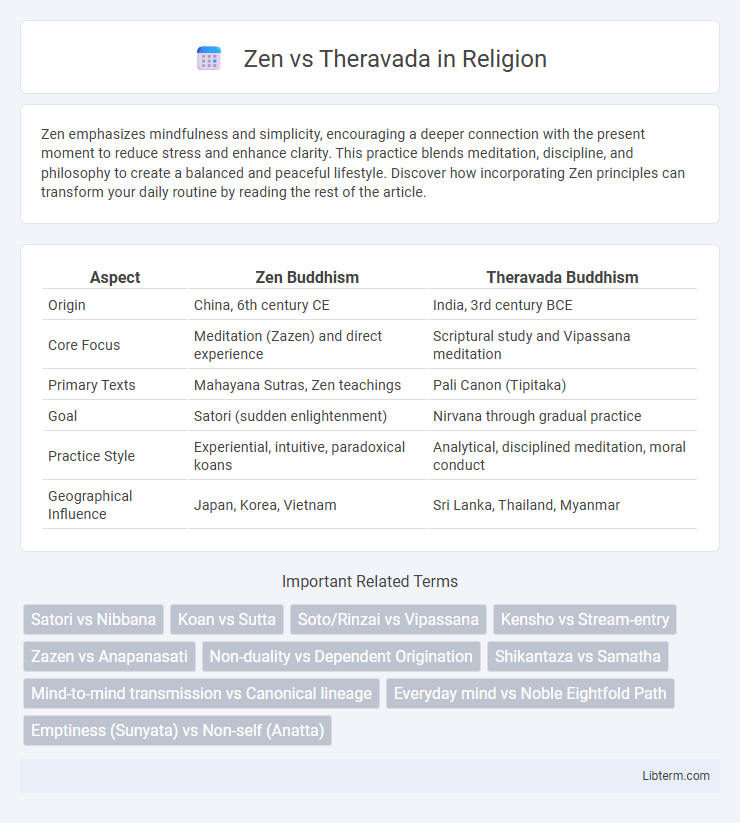Zen emphasizes mindfulness and simplicity, encouraging a deeper connection with the present moment to reduce stress and enhance clarity. This practice blends meditation, discipline, and philosophy to create a balanced and peaceful lifestyle. Discover how incorporating Zen principles can transform your daily routine by reading the rest of the article.
Table of Comparison
| Aspect | Zen Buddhism | Theravada Buddhism |
|---|---|---|
| Origin | China, 6th century CE | India, 3rd century BCE |
| Core Focus | Meditation (Zazen) and direct experience | Scriptural study and Vipassana meditation |
| Primary Texts | Mahayana Sutras, Zen teachings | Pali Canon (Tipitaka) |
| Goal | Satori (sudden enlightenment) | Nirvana through gradual practice |
| Practice Style | Experiential, intuitive, paradoxical koans | Analytical, disciplined meditation, moral conduct |
| Geographical Influence | Japan, Korea, Vietnam | Sri Lanka, Thailand, Myanmar |
Introduction to Zen and Theravada
Zen Buddhism emphasizes direct experience, meditation (zazen), and intuitive understanding, originating from Mahayana traditions in China and Japan. Theravada Buddhism, rooted in the earliest Buddhist scriptures, prioritizes the Pali Canon, monastic discipline, and insight meditation (vipassana) aimed at individual enlightenment. Both traditions offer distinct pathways to awakening, with Zen focusing on sudden realization and Theravada on gradual mindfulness and ethical practice.
Historical Origins and Development
Zen Buddhism developed in China during the Tang dynasty as a distinct school emphasizing meditation (zazen) and direct insight, later spreading to Japan where it evolved unique practices. Theravada Buddhism traces its origins to the earliest Buddhist councils after the Buddha's death, preserving the Pali Canon and emphasizing monastic discipline and doctrinal study. While Theravada maintained a conservative approach focused on the historical Buddha's teachings, Zen integrated Mahayana philosophy and adapted to East Asian cultural contexts.
Core Philosophies Compared
Zen emphasizes direct insight through meditation and experiential awakening, prioritizing sudden enlightenment (satori) and non-dualistic awareness. Theravada centers on the Four Noble Truths and the Eightfold Path, stressing ethical conduct, mindfulness, and gradual liberation through personal effort and wisdom. Both traditions value meditation but differ in approach: Zen uses koans to transcend conceptual thinking, while Theravada employs Vipassana mindfulness to cultivate moment-to-moment awareness of reality.
Meditation Practices: Zazen vs Vipassana
Zazen, the core meditation practice in Zen Buddhism, emphasizes seated meditation with a focus on breath awareness and observing thoughts without attachment, fostering sudden insight and direct experience of reality. Vipassana, central to Theravada Buddhism, involves mindful observation of bodily sensations and mental phenomena to cultivate deep insight into impermanence, suffering, and non-self through systematic and continuous mindfulness. Both techniques aim to develop clarity and awakening but differ in method and philosophical approach, with Zazen leaning toward intuitive awareness and Vipassana toward analytical observation.
Approaches to Enlightenment
Zen emphasizes direct experience and meditation (zazen) to achieve sudden insight (satori) into the nature of mind and reality. Theravada focuses on a gradual path through ethical conduct (sila), concentration (samadhi), and wisdom (panna) derived from the Pali Canon teachings. Both traditions aim for enlightenment (nirvana) but differ in practice intensity and doctrinal emphasis.
Key Scriptures and Teachings
Zen Buddhism primarily centers around the teachings found in the Platform Sutra of the Sixth Patriarch and emphasizes direct experience and meditation (zazen) to achieve sudden enlightenment. Theravada Buddhism relies heavily on the Pali Canon, especially the Tipitaka, focusing on the Four Noble Truths and the Eightfold Path as systematic instructions for gradual liberation from suffering. Both traditions prioritize mindfulness and ethical conduct, but Zen stresses intuitive insight beyond textual study, while Theravada adheres strictly to scripture-based practice and monastic discipline.
Monastic Life and Daily Practices
Zen Buddhism emphasizes meditation (zazen) as the core monastic practice, with monks dedicating hours to silent sitting, koan study, and mindful activities that cultivate direct experience of enlightenment. Theravada monastic life centers on strict adherence to the Vinaya code, daily alms rounds (pindapata), chanting Pali scriptures, and insight meditation (vipassana) aimed at understanding impermanence and suffering. Both traditions prioritize discipline and simplicity, but Theravada monastics maintain a more formal ritual structure, while Zen practices encourage spontaneous awareness and minimal ritual.
Rituals and Symbolism
Zen Buddhism emphasizes simplicity and direct experience, minimizing rituals and symbolic practices to foster meditation and mindfulness. Theravada Buddhism incorporates detailed rituals such as chanting, offerings, and observance of precepts, with strong symbolic elements tied to the Pali Canon and monastic traditions. Both traditions use symbolism uniquely: Zen focuses on koans and natural imagery to provoke insight, while Theravada relies on statues, stupas, and ceremonial rites to reinforce doctrinal teachings and community cohesion.
Influence on Modern Mindfulness
Zen Buddhism and Theravada Buddhism have both significantly shaped modern mindfulness practices, with Zen emphasizing direct experiential awareness and Theravada focusing on systematic insight meditation (Vipassana) rooted in early Buddhist teachings. The influence of Zen is evident in the popularization of mindfulness as a practice of non-judgmental present-moment awareness, often integrated into secular contexts such as healthcare and psychology. Theravada's rigorous analytical approach to mindfulness underpins many evidence-based interventions by training practitioners to observe mental and physical processes with clarity and equanimity.
Choosing Between Zen and Theravada
Choosing between Zen and Theravada Buddhism involves understanding their core practices and philosophical emphases. Zen focuses on direct experience through meditation and koan practice to achieve sudden enlightenment, emphasizing mindfulness and simplicity. Theravada prioritizes the study of the Pali Canon and gradual cultivation of insight and ethical discipline to attain Nirvana, making it more systematic and doctrinal in approach.
Zen Infographic

 libterm.com
libterm.com